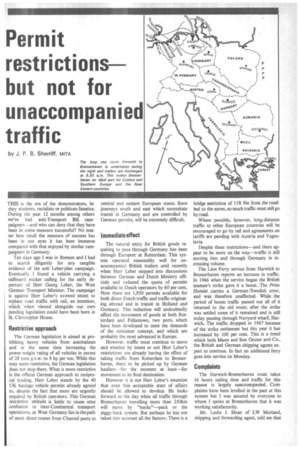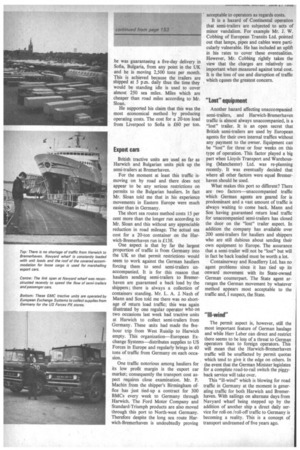Permit restrictions but not for unaccompanied traffic
Page 155

Page 156

If you've noticed an error in this article please click here to report it so we can fix it.
by J. P. B. Sherriff, MITA
THIS is the era of the demonstrators, be they students, racialists or politican fanatics. During the past 12 months among others we've had anti-Transport Bill cam paigners and who can deny that they have been in some measure successful? No matter how small the measure of success has been in our eyes it has been immense compared with that enjoyed by similar campaigners in Germany.
Ten days ago I was in Bremen and I had to search diligently for any tangible evidence of the anti Leber-plan campaign. Eventually I found a vehicle carrying a tailboard sticker calling for the early departure of Herr Georg Leber, the West German Transport Minister. The campaign is against Herr Leber's avowed intent to replace road traffic with rail, an intention, which when viewed alongside our own pending legislation could have been born in St. Christopher House.
Restrictive approach
The German legislation is aimed at prohibiting heavy vehicles from autobahnen and at the same time increasing the power-weight rating of all vehicles in excess of 28 tons g.v.w. to 8 hp per ton. While this may seem restrictive, the German legislation does not stop there. What is more restrictive is the official German approach to reciprocal trading, Herr Leber stands by the 40 UK haulage vehicle permits already agreed to, despite the fact that more are urgently required by British operators. This German restrictive attitude is liable to cause utter confusion in inter-Continental transport operations, as West Germany lies in the path of most direct routes from Channel ports to central and eastern European states. Soon journeys south and east which necessitate transit in Germany and are controlled by German permits, will be extremely difficult.
Immediate effect
The natural entry for British goods requiring to pass through Germany has been through Europort at Rotterdam. This system operated reasonably well for unaccompanied British trailers until recently when Herr Leber stepped into discussions between German and Dutch Ministry officials and reduced the quota of permits available to Dutch operators by 60 per cent. Now there are 1,950 permits available for both direct Dutch traffic and traffic originating abroad and in transit in Holland and Germany. This reduction will undoubtedly affect the movement of goods at both Rotterdam and Felixstowe, two ports which have been developed to meet the demands of the container concept, and which are probably the most advanced in Europe.
However, traffic must continue to move and whether by intent or not Herr Leber's restrictions are already having the effect of taking traffic from Rotterdam to Bremerhaven, there to be picked up by German hauliers—for the moment at least—for movement to its final destination.
However it is not Herr Leber's intention that even this acceptable state of affairs should be allowed to develop. He looks forward to the day when all traffic through Bremerhaven travelling more than 250km will move by "hucke"—pack or the piggy-back system. But perhaps he has not taken into account all the factors: There is a bridge restriction of Ilft 9in from the roadbed to the eaves, so much traffic must still go byroad.
Where possible, however, long-distance traffic to other European countries will be encouraged to go by rail and agreements on tariffs are pending with Austria and Yugoslavia.
Despite these restrictions—and there appear to be more on the way—traffic is still moving into and through Germany in increasing volume.
The Lion Ferry service from Harwich to Bremerhaven reports an increase in traffic. In 1966 when the service began the British seamen's strike gave it a boost. The Prins Handel carries a German /Swedish crew, and was therefore unaffected. While the period of boom traffic passed not all of it returned to the old route; after the strike was settled some of it remained and is still today passing through Navyard wharf, Harwich. The traffic dropped in 1967 because of the strike settlement but this year it has increased by 100 per cent. This is a trend which both Mann and San Geuter and Co., the British and German shipping agents expect to continue. In fact an additional ferry goes into service on Monday.
Complaints
The Harwich-Bremerhaven route takes 16 hours sailing time and traffic for this reason is largely unaccompanied. Complaints have been levelled in the past at this system but I was assured by everyone to whom I spoke at Bremerhaven that it was working satisfactorily.
Mr. Leslie J. Sloan of LW Morland, shipping and forwarding agent, told me that he was guaranteeing a five-day delivery in Sofia, Bulgaria, from any point in the UK and he is moving 2,500 tons per month. This is achieved because the trailers are shipped at 5 p m. daily thus the time they would be standing idle is used to cover almost 250 sea miles. Miles which are cheaper than road miles according to Mr. Sloan.
He supported his claim that this was the most economical method by producing operating costs. The cost for a 20-ton load from Liverpool to Sofia is £60 per ton.
Expoit cars
British tractive units are used as far as Harwich and Bulgarian units pick up the semi-trailers at Bremerhaven.
For the moment at least this traffic ismoving on by road and there does not appear to be any serious restrictions on permits to the Bulgarian hauliers. In fact Mr. Sloan told me that in his experience movements in Eastern Europe were much easier than in Germany.
The short sea routes method costs 15 per cent more than the longer run according to Mr. Sloan and this without any appreciable reduction in road mileage. The actual sea cost for a 20-ton container on the Harwich-Bremerhaven run is £138.
One aspect is that by far the largest proportion of traffic is from Germany into the UK so that permit restrictions would seem to work against the German hauliers forcing them to send semi-trailers unaccompanied. It is for this reason that hauliers sending semi-trailers to Bremerhaven are guaranteed a back load by the shippers ; there is always a collection of containers standing. Mr. L. A. I Nash of Mann and Son told me there was no shortage of return load traffic; this was again illustrated by one regular operator who on two occasions last week had tractive units at Harwich to collect semi-trailers from Germany. These units had made the fivehour trip from West Ruislip to Harwich empty. This organization—European Exchange Systems—distributes supplies to US Forces in Europe and regularly brings in 40 tons of traffic from Germany on each occasion.
One traffic notorious among hauliers for its low profit margin is the export car market; consequently the transport cost aspect requires close examination. Mr. P. Machin from the shipper's Birmingham office has just tied-up a contract for 300 BMCs every week to Germany through Harwich. The Ford Motor Company and Standard-Triumph products are also moved through this port to North-west Germany. Therefore despite the long sea route Harwich-Bremerhaven is undoubtedly proving acceptable to operators as regards costs.
It is a hazard of Continental operation that semi-trailers are subjected to acts of minor vandalism. For example Mr. I. W. Cobbing of European Transits Ltd. pointed out that lamps, pipes and cables were particularly vulnerable. He has included an uplift in his rates to cover these eventualities. However, Mr. Cobbing rightly takes the view that the charges are relatively unimportant when measured against total cost. It is the loss of use and disruption of traffic which causes the greatest concern.
"Lost" equipment
Another hazard affecting unaccompanied semi-trailers, and Harwich-Bremerhaven traffic is almost always unaccompanied, is a "lost" trailer. It is an open secret that British semi-trailers are used by European agents for their own internal traffics without any payment to the owner. Equipment can be "lost" for three or four weeks on this type of operation. This factor played a big part when Lloyds Transport and Warehousing (Manchester) Ltd. was re-planning recently. It was eventually decided that where all other factors were equal Bremerhaven should be used.
What makes this port so different? There are two factors—unaccompanied traffic which German agents are geared for is predominant and a vast amount of traffic is always waiting to come back. Mann and Son having guaranteed return load traffic for unaccompanied semi-trailers has closed the door on the "lost" trailer aspect. In addition the company has available over 200 semi-trailers for hauliers and shippers who are still dubious about sending their own equipment to Europe. The assurance that a semi-trailer will not be "lost" but will in fact be back loaded must be worth a lot.
Containerway and Roadferry Ltd. has no agent problems since it has tied up its onward movement with its State-owned German counterpart. The State agent arranges the German movement by whatever method appears most acceptable to the traffic and, I suspect, the State.
"III-wind"
The permit aspect is, however, still the most important feature of German haulage and while Herr Leber can direct and restrict there seems to be less of a threat to German operators than to foreign operators. This will mean that the Harwich-Bremerhaven traffic will be unaffected by permit quotas which tend to give it the edge on others. In the event that the German Minister legislates for a complete road-to-rail switch the piggyback service will take over.
This "ill-wind" which is blowing for road traffic in Germany at the moment is generating traffic for both Harwich and Bremerhaven. With sailings on alternate days from Navyard wharf being stepped up by the addition of another ship a direct daily service for roll-on /roll-off traffic to Germany is becoming a reality. This is a concept of transport undreamed of five years ago.








































































































































































































